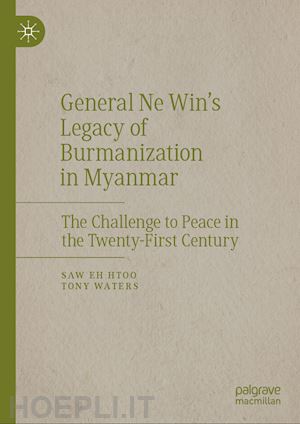
Questo prodotto usufruisce delle SPEDIZIONI GRATIS
selezionando l'opzione Corriere Veloce in fase di ordine.
Pagabile anche con Carta della cultura giovani e del merito, 18App Bonus Cultura e Carta del Docente
This book focuses on how Burmanization created and reinforced ethnic divides since the 1962 coup d’etat. when General Ne Win concentrated all authority in the Burmese speaking army. Background research for the book includes Burmese language materials from the Burmese Socialist Party (BSP) and others that describe with what the BSP believed in their own terms. This is unique from previous works on the topic which either simply pointed out that the policies “didn’t work” and therefore are uninteresting, or to claim that they were “necessary” given the chaos of the previous regime. The authors agree that Ne Win’s policies “didn’t work.” However, the book goes further by elaborating why Burmanization policies developed in the 1960s are important for understanding Burmese society today. Most importantly, Ne Win’s ideology reflects how patterns of interethnic relationships in Myanmar lead to the “intractability” of the battles in early twenty-first century Myanmar.
Part I: Introduction: Why Burmanization is Important.- Chapter 1: Eh Htoo’s Auto-biography.- Chapter 2: Why Ne Win’s Burmanization Policies are Still Important Sixty Years Later: The Burmese Burden.- Part II: The Historical Origins of Burmanization.- Chapter 3: Historical Narratives and Burmanization (1824-1947).- Chapter 4: Aung San, U Nu, and Ne Win Create a New Country (1948-1962).- Chapter 5: Ne Win’s Burmanization Ideology: The Burmese Way to Socialism (1962-1966).- Chapter 6: Ne Win’s Political Ideology: One Culture, One Economy, One Military(19671989).- Chapter 7: Ne Win’s Policies after Ne Win (1988-2020) and Saw Eh Htoo’s Hopes.- Part III: The Sociology of Burmanization and the Search for Peace.- Chapter 8: The Narratives of Othering and The Sociological Consequences of Burmanization.- Chapter 9: Final Thoughts about Burmanization by Tony Waters.
Saw Eh Htoo was born in the Irrawaddy River Delta in 1976, to a Karen family. He later moved to Yangon where he studied Philosophy (B.A.), Christian Studies (M.A.) and Cultural Anthropology (M.A.). At the time of his death he was completing his PhD dissertation at Payap University, Chiangmai, on which this book is based. He founded a Myanmar NGO Kaw Lah Foundation which did applied field research in Rakhine, Chin, Shan and Kayin (Karen) States; and Bago Region in Myanmar.
Tony Waters is a Professor of Sociology currently at Leuphana University (Germany). Previously he taught at Payap University in Thailand, and at California State University, Chico, USA. He is the author of academic books and articles dealing with issues of social theory, East Africa, mainland Southeast Asia, refugees, and other sociological subjects.











Il sito utilizza cookie ed altri strumenti di tracciamento che raccolgono informazioni dal dispositivo dell’utente. Oltre ai cookie tecnici ed analitici aggregati, strettamente necessari per il funzionamento di questo sito web, previo consenso dell’utente possono essere installati cookie di profilazione e marketing e cookie dei social media. Cliccando su “Accetto tutti i cookie” saranno attivate tutte le categorie di cookie. Per accettare solo deterninate categorie di cookie, cliccare invece su “Impostazioni cookie”. Chiudendo il banner o continuando a navigare saranno installati solo cookie tecnici. Per maggiori dettagli, consultare la Cookie Policy.